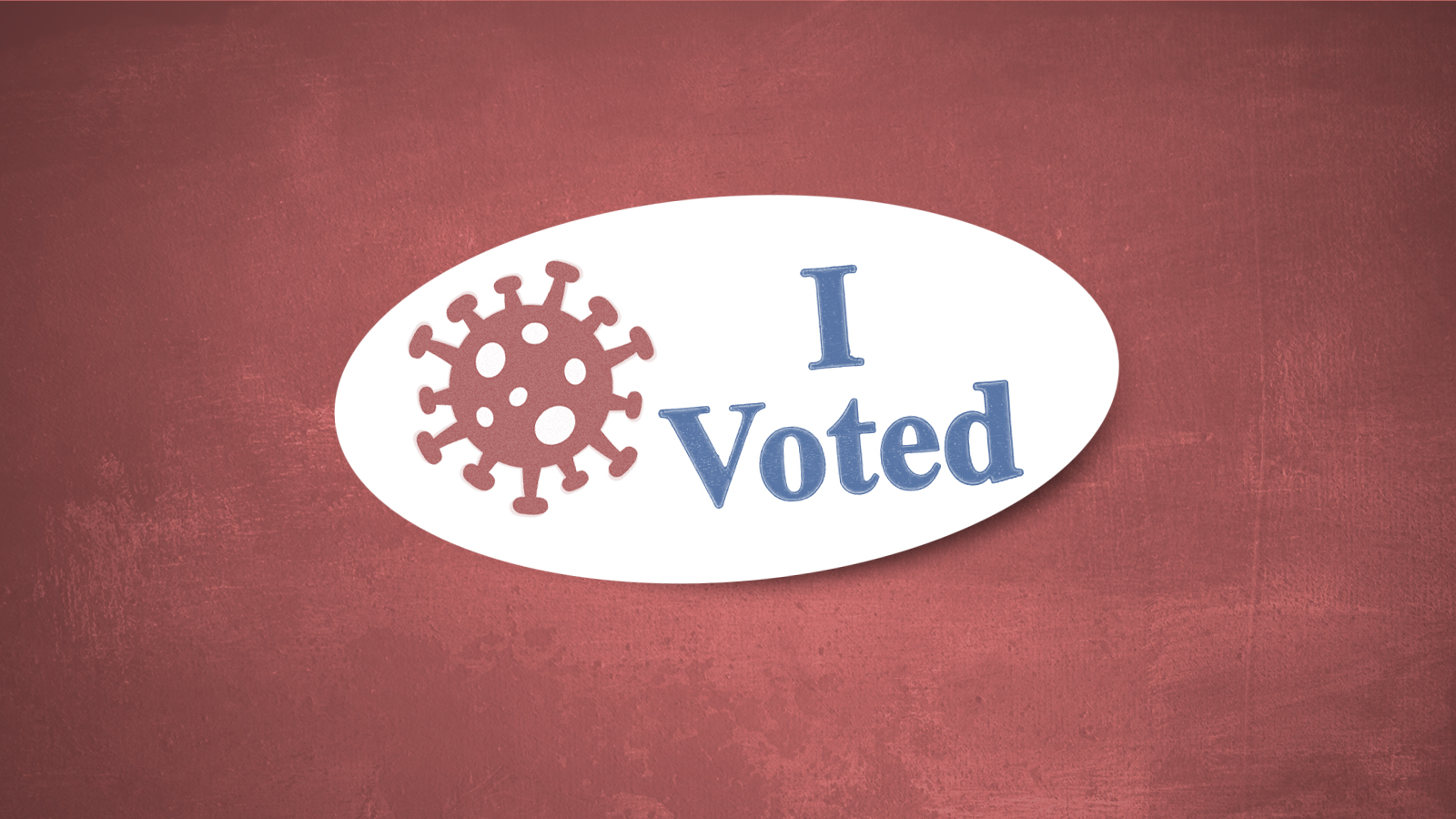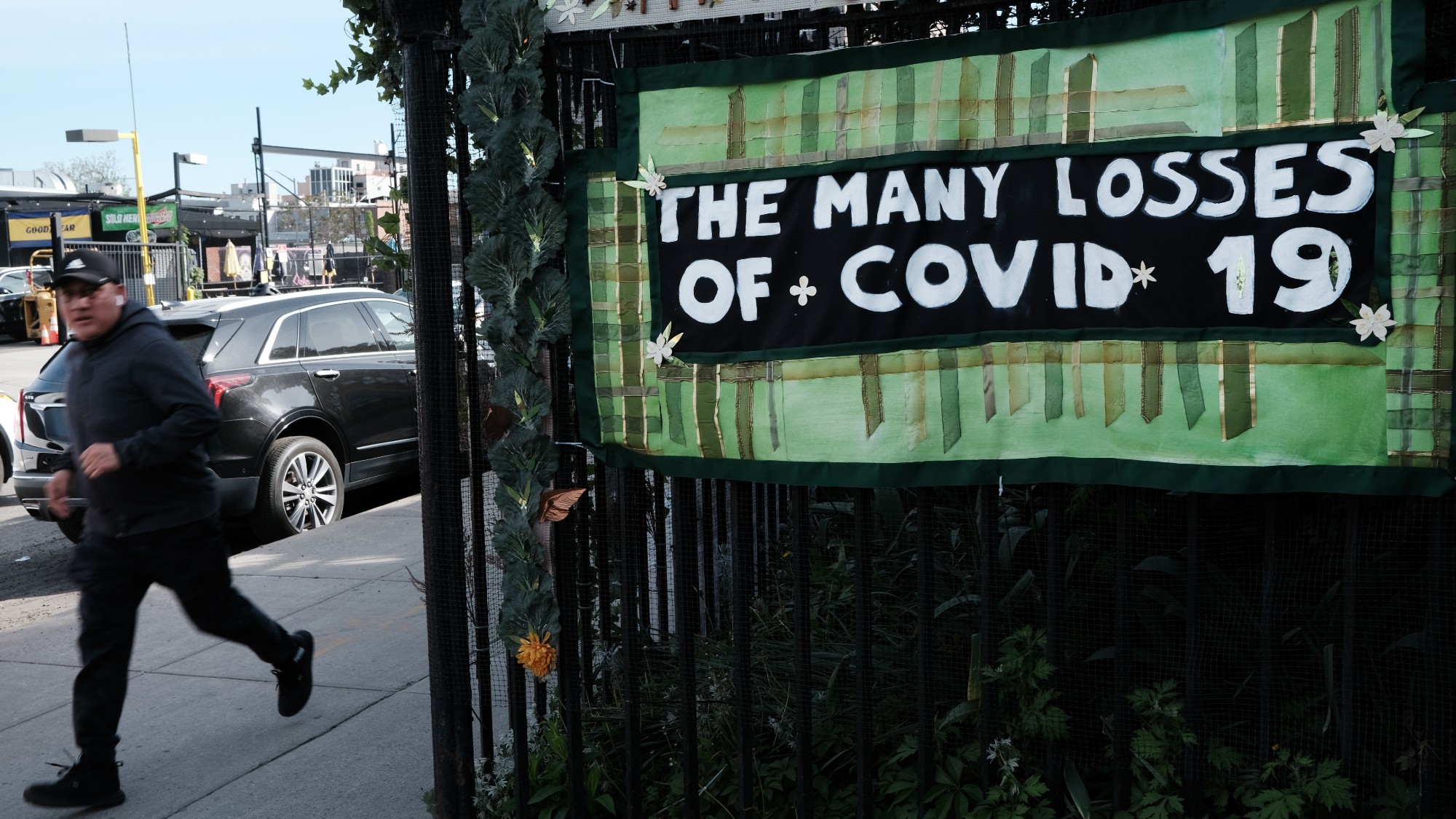COVID will stalk the GOP in 2024
The potential Republican presidential field is already taking very unpopular positions on the pandemic


A free daily email with the biggest news stories of the day – and the best features from TheWeek.com
You are now subscribed
Your newsletter sign-up was successful
Florida's embattled Republican Gov. Ron DeSantis threatened Monday to fine cities and counties that impose vaccination mandates for their employees, merely the latest in a long line of actions that has earned him a reputation as the most objectively pro-COVID governor in the U.S. But DeSantis is hardly alone – the GOP's 2024 hopefuls are adopting hardline and broadly unpopular anti-mask and anti-vaccine mandate positions that are going to get a lot of people killed and could make the party's path back to power more complicated.
Elected Republicans insist that they are pro-vaccine, of course, and have encouraged and even pleaded with people to get their shots. Yet the national vaccination campaign more or less stalled out over the summer at levels far short of what is needed to return to full normalcy. By opposing vaccine mandates, Republicans like DeSantis are essentially throwing up their hands and saying there is nothing they can do other than beg. That is what the Republican base — which now includes millions of hardcore anti-vaxxers — wants. The national majority, however, wants both mitigation measures like masks and vaccine mandates and regards GOP rhetoric about how vaccination is a "personal choice" as one of the causes of our ongoing anguish.
The numbers are pretty unambiguous. No one enjoys wearing a mask, but despite widespread fatigue with the pandemic's most contentious mitigation strategy, majorities still support requiring them in schools, with one poll pegging support at 69 percent. Close to a supermajority in that same poll favor indoor mask mandates, while just a third of respondents believe that state governments should ban school districts and universities from mandating masks, as Florida, Texas, and a number of other red state governors have done. Evidence that masks help slow the spread of the hyper-contagious Delta variant continues to pile up.
The Week
Escape your echo chamber. Get the facts behind the news, plus analysis from multiple perspectives.

Sign up for The Week's Free Newsletters
From our morning news briefing to a weekly Good News Newsletter, get the best of The Week delivered directly to your inbox.
From our morning news briefing to a weekly Good News Newsletter, get the best of The Week delivered directly to your inbox.
The topline numbers aren't quite as lopsided for vaccine mandates, but Republicans are on the wrong side of public opinion here too. Fifty-four percent of respondents support workplace vaccine mandates, 55 percent support them in schools and even for people attending outdoor events like concerts and professional sports. When pollsters ask about rapid testing to get into the workplace (which Biden's plan offers as an alternative to vaccination), it's 79 percent in favor. If you want a sense of how angry the vaccinated are at the unvaccinated, 41 percent of Americans in one poll say you shouldn't be allowed into a grocery store without proof of the jabs. In other words, we are closing in on half the country supporting informal house arrest for vaccine refusers. The longer the crisis goes on, the higher that number is going to go.
In all likelihood, staking out public opposition to vaccine requirements is going to look much worse in a few months than it does now. Many people who tell pollsters they oppose workplace mandates are going to grumble about it but then go hold out their arms for the needle anyway, to keep their jobs. They are then going to watch their unvaccinated friends and former coworkers get gravely ill with or die from COVID-19, while they themselves either skate by with no infection or get a mild breakthrough case that is manageable at home. Here and there, minds will be changed. For people who choose voluntary unemployment over a free, life-saving vaccine, there is also the problem that past unemployment reduces your likelihood of turning out to vote by 9 percent, according to one Oxford University study.
The health of the economic recovery depends on increasing the number of people who feel comfortable doing normal, pre-2020 activities like going out to eat, hopping a flight to see friends and family, going to the movies, and more. A sense of security and safety from COVID is also vital for getting people back to work. The country's vaccine holdouts mostly never changed their behavior to begin with, and so there's not much economic vitality left to squeeze out of them.
That means that the path to pre-pandemic levels of unemployment, spending, and growth runs straight through the minds of vaccinated Americans. The good news is that workplace vaccine mandates, together with booster shots and the long-awaited rollout of vaccines for children under 12, will dramatically alter the risk calculus of what you might call Normalcy Hesitant vaccinated people. These are folks who are still not doing many 2019 activities out of concern for their children and elderly or immunocompromised loved ones. Another subset is so spooked by breakthrough infections that they are holding back because they are worried about themselves.
A free daily email with the biggest news stories of the day – and the best features from TheWeek.com
These groups were most likely to regard President Biden's Thursday address about the Delta variant as long overdue, a view that I share amid my own great frustration with the pace of under-12 vaccine approval and booster rollout. But whatever your vaccine status, that speech and the aggressive new measures the administration is rolling out to put pressure on anti-vaxxers will be regarded as a kind of inflection point. And whether those new policies succeed in turning the COVID situation around now or perhaps after another winter wave, voters are going to connect whatever happens over the next year with the president's aggressive new stances on vaccines.
Personally, I wouldn't want to be on the "let it rip" side of this debate if I had aspirations for an office higher than governor of Oklahoma. DeSantis and other Republicans like Greg Abbott are already suffering a decline in their popularity because of their extremist COVID policies. DeSantis, who as of today is the de facto leader in the non-Trump 2024 field, has seen his approval ratings plummet 14 points since July, and no longer enjoys majority support from Floridians. More than 7,000 citizens of the Sunshine State have died of COVID-19 in the past 30 days, hundreds of thousands more have become infected, and the state's return to in-person school has been a complete fiasco precisely because DeSantis has prevented districts from implementing mitigation measures. All of this deadly posturing has succeeded in little other than buying Florida a higher unemployment rate than Massachusetts, Michigan, and Vermont.
We all know that the public's attention span is short. But no one is going to be forgetting the pandemic anytime soon, and it is likely to be an important issue in the November 2022 midterm elections and beyond. While the Biden administration is still displaying an inexplicable lack of urgency in moving up the timeline for children to get vaccinated, the reality is that the coronavirus crisis is going to end on President Biden's watch, and vaccine mandates and masks are going to widely credited with helping turn the tide.
What are Ron DeSantis, Kristi Noem, and other 2024 contenders going to have to show for their opposition, other than a pile of dead citizens and the emotional glow of sucking up to Donald Trump? They may parlay their outrage-a-day governing into a serious run for the GOP nomination in three years, but the guess here is that this lethal libertarian theater will be a huge liability for DeSantis in next year's governor's race and whoever captures the presidential nomination in 2024.
And as Trump discovered, there's no vaccine for being unloved.
David Faris is a professor of political science at Roosevelt University and the author of "It's Time to Fight Dirty: How Democrats Can Build a Lasting Majority in American Politics." He's a frequent contributor to Newsweek and Slate, and his work has appeared in The Washington Post, The New Republic and The Nation, among others.
-
 5 cinematic cartoons about Bezos betting big on 'Melania'
5 cinematic cartoons about Bezos betting big on 'Melania'Cartoons Artists take on a girlboss, a fetching newspaper, and more
-
 The fall of the generals: China’s military purge
The fall of the generals: China’s military purgeIn the Spotlight Xi Jinping’s extraordinary removal of senior general proves that no-one is safe from anti-corruption drive that has investigated millions
-
 Why the Gorton and Denton by-election is a ‘Frankenstein’s monster’
Why the Gorton and Denton by-election is a ‘Frankenstein’s monster’Talking Point Reform and the Greens have the Labour seat in their sights, but the constituency’s complex demographics make messaging tricky
-
 The billionaires’ wealth tax: a catastrophe for California?
The billionaires’ wealth tax: a catastrophe for California?Talking Point Peter Thiel and Larry Page preparing to change state residency
-
 Bari Weiss’ ‘60 Minutes’ scandal is about more than one report
Bari Weiss’ ‘60 Minutes’ scandal is about more than one reportIN THE SPOTLIGHT By blocking an approved segment on a controversial prison holding US deportees in El Salvador, the editor-in-chief of CBS News has become the main story
-
 Has Zohran Mamdani shown the Democrats how to win again?
Has Zohran Mamdani shown the Democrats how to win again?Today’s Big Question New York City mayoral election touted as victory for left-wing populists but moderate centrist wins elsewhere present more complex path for Democratic Party
-
 Millions turn out for anti-Trump ‘No Kings’ rallies
Millions turn out for anti-Trump ‘No Kings’ ralliesSpeed Read An estimated 7 million people participated, 2 million more than at the first ‘No Kings’ protest in June
-
 Ghislaine Maxwell: angling for a Trump pardon
Ghislaine Maxwell: angling for a Trump pardonTalking Point Convicted sex trafficker's testimony could shed new light on president's links to Jeffrey Epstein
-
 The last words and final moments of 40 presidents
The last words and final moments of 40 presidentsThe Explainer Some are eloquent quotes worthy of the holders of the highest office in the nation, and others... aren't
-
 The JFK files: the truth at last?
The JFK files: the truth at last?In The Spotlight More than 64,000 previously classified documents relating the 1963 assassination of John F. Kennedy have been released by the Trump administration
-
 'There is a certain kind of strength in refusing to concede error'
'There is a certain kind of strength in refusing to concede error'instant opinion 'Opinion, comment and editorials of the day'
